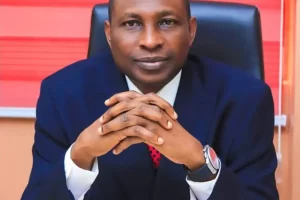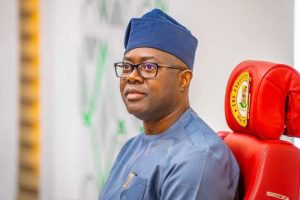In this interview with EDIDIONG IKPOTO, the Commissioner for Finance in Lagos State, Rabiu Olowo, speaks on the state’s recently unveiled whistleblower initiative and how it will affect accountability
The Lagos Inland Revenue Service inaugurated a whistleblower initiative recently, tell us what this entails?
It is a whistleblower initiative like you said, but we like to call it the ‘speak up’ initiative. It is part of an ongoing effort to deepen transparency, accountability and promote integrity within the system. So we are giving an opportunity, an avenue whereby whether it is our staff or those who do business with us, our vendors or contractors, third party or citizen, when they see something, they say something. When they observe any wrongdoing within the system, they should have the opportunity to report those wrongdoings in a very safe and compliant way. That is exactly what we are doing.
Is the initiative limited to revenue and tax related matters, or is it a state-wide programme?
The whistleblower initiative is a state-wide programme by the Lagos State Government. It is an initiative that is sponsored in this administration, with the sponsorship of the governor himself, Mr. Babajide Sanwo-Olu, so that across our system, across our civil service, it will deepen that culture of ‘see something, say something.’ At the end of the day, it will promote transparency and accountability across our ministries, departments and agencies. So the answer is that it is a state-wide initiative and we are starting with a few MDAs. LIRS is one of our big revenue generating agency and it just makes sense that we start from there.
Who exactly qualifies as a whistleblower?
Everyone qualifies to be a whistleblower. Anyone who perceives any wrongdoing, anyone who sees an improvement opportunity within our system and wants to let us know, anyone who has been unfairly treated. Anyone who has any tangible thing to report as part of our compliance framework, whether our staff, vendors, contractors, consultants or even citizens, they all qualify to speak up when they see something.
What have you put in place to guarantee the security of whistleblowers?
So we know that one of the reasons why people don’t want to speak up when they observe a wrongdoing is due to the fear of retaliation or reprisal attacks. So we recognise this, and that’s why we value when people take the risk to come up to say something on any observed wrongdoing that they see within the system. They are heroes and the least we can do for them is to protect them. So, within the framework, we have an array, a number of mitigants that we have put in place. First, you can make reports anonymously, we don’t even need to know your name, I think when it starts from there, they can be rest assured. They can have that confidence that since their name their identity are protected, it will go a long way to take them away from focus.
The second thing is that, due to the nature or the characteristics of some of the reports that they will give, sometimes we need to do follow up. Some people might even report partially anonymous, maybe through emails. We will have the opportunity of following up with them, even if their identity becomes known, maybe because they didn’t report anonymously and all of that, we owe them a duty to protect them. We owe them a duty to make them not to fall victim of reprisal attacks within our system. We have a framework on that and we have a commitment to do that as a government.
Is there a way to check false whistleblowing?
It is not uncommon that within many reports you will find the one that are made either with bad intention or that cannot be affirmed in the face of investigation. So this is common. What I will say is that we implore everyone to genuinely report perceived wrongdoing that they observe within the system. What I will say in order not to discourage people is that even when they report, it is our investigation, our analysis, our review process that will prove whether any wrongdoing has actually been committed or not. So we implore everyone to come up to report anything. That’s why you see that the word is ‘observed wrongdoing.’ It might be proven right or wrong, but we owe them a duty of thorough investigation and that is exactly what our investigation would do.
If someone reports falsehood, will the person be prosecuted for that?
We certainly discourage intentional reporting of falsehood. It is morally incorrect. We do not encourage it. But at this stage, we will focus more on the information. We want to strengthen our investigative resources in order to distinguish between falsehood and those reporting that we can affirm to be true, we want to focus on that. For if I say if you report anything, and we find it not to be true, this and this will happen to you, people who come up to report unintentionally, maybe they saw something happening, we may end up sending them out of the cycle. So we will focus on the information that we receive through this system to ensure that we properly investigate it. Our investigative ability will distinguish between right and wrong. So in as much as we discourage, we find it unacceptable for anyone, maybe due to personal issues, to promote lies against people. It is morally incorrect and unacceptable in the system.
What are the channels through which a whistleblower can report?
There are quite a number of channels. The first thing we must know is that Lagos State has partnered with the world’s leading firm, Deloitte, who manages the anonymous whistleblowing channels. We have emails, we have telephone numbers, and we have an app that can be downloaded on iOS and other Android devices. For the benefit of those who would read us, the telephone number is 08008476337. And the email is tip-offs.deloitte.com.ng. So you can make your report, or you can download the app and simply make your report based on the observed misconduct or issues that you have seen anywhere within our system.
Can you shed more light on the mechanisms in place to make this initiative successful?
One of the mechanism is to understand the process to which this was designed. It is not even government that receives this report in the first place, it is an independent third party, trusted consulting organisation. They process it, the forensic organisation does what we call an initial case review, to see what kind of investigation and review that will be recommended. It comes to the highest level of officials within the system, not even the management staff of the MDA in question. Then when those reports come, we now analyse who needs to know within the system. Because when report comes and it gets into the hands of even the person that is being reported against, it means that the foundation of that is not good.
So we have controls, we have different levels of authority based on different categories of reports. One other thing is the timeline. Issues are treated depending on their complexities, and they are treated timely so that we can give confidence to whoever is reporting.























Add Comment